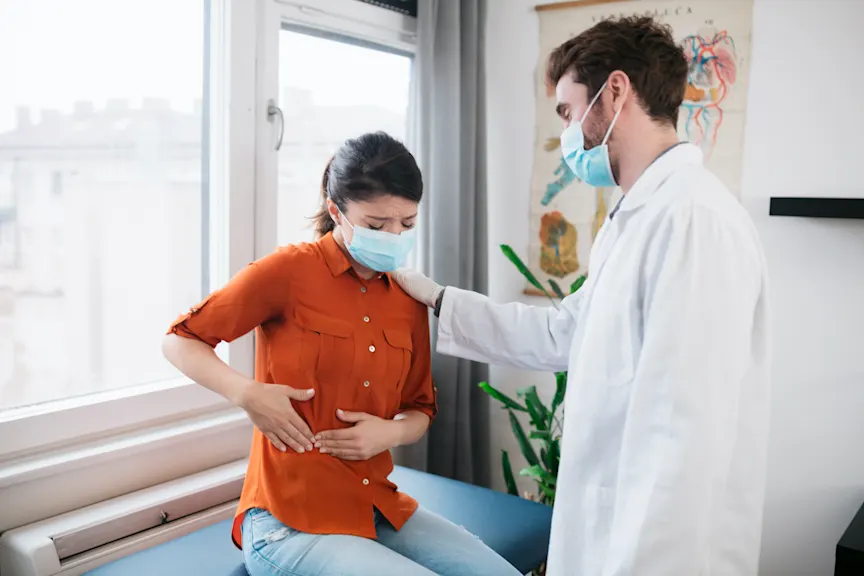Covid期间的UC治疗计划
安全至关重要,但您的健康状况也是如此。这是如何拥有最好的两者。

粗略在美国的一百万人患有溃疡性结肠炎(UC),创造了一个坚实的计划,以便保持一致的护理和粘附,这可能意味着杀死日常生活之间的差异,如老板或不断担心是否卫生间在附近。这是低调:UC是一种慢性炎症肠道条件,其影响结肠和直肠的衬里(构成大肠的部件),并可能导致小疮或溃疡形成。“发生了什么是免疫系统陷入误认为是冒号的误解,”萨尔特·佩格,胃肠学家,西雅图汽油学家狂欢节。他说,当结肠发炎时,它会导致粪便急躁,疲劳,尿道,粘液等粪便,血腥粪便和腹痛,这可能会随着时间的推移而变得更糟。
Because UC is a chronic and often unpredictable condition, it won’t go away, but when you find (and stay on!) the right meds and check in with your doc regularly, it can become asymptomatic during periods of remission (these can span months or even years). However, every GI doc on the planet will tell you that even during times of remission it’s still important to continue taking your meds and going in for checkups. Which, in theory, all sounds like an easy plan during normal circumstances. Now throw in COVID, which has everyone avoiding doctor’s appointments like the plague and lapsing on regular care—a big no-no for anyone with IBD. To ease your angst, here’s what you need to know about routine care in the face of COVID.
看到你的医生。是的,亲自。
希望你正在照顾好像钟表,条件在缓解中。If this is, in fact, the case, you should typically see your physician once every six months—particularly to monitor bloodwork and make sure there are no side effects from your meds, says Siobhan Proksell, M.D., a gastroenterologist with the University of Miami Health System and assistant professor of clinical medicine at the University of Miami Miller School of Medicine. However, if you’re experiencing a flareup or having any new signs or symptoms, an in-person physical exam is necessary and should be done without delay. “We need to see someone in person, because there are things that you cannot do without a rectal or abdominal exam,” Dr. Guturu says.
对安全措施感到充满信心
我们完全让您可能担心亲本医生的约会。但知道这一点:办公室正在将阳光下的每一个安全措施放入常规方案,以使Covid威胁遥远的遏制。While every practice may have a slight variation in procedure (and you should call your own doc’s office to find out theirs), many, like the University of Miami Health System, are giving patients symptom-screening questionnaires even before entering the building, and administering temperature checks upon arrival, Dr. Proksell says. “Waiting rooms are set up in such a way that allow for patients to maintain adequate distance while waiting, staff are masked and maintaining appropriate social distance whenever possible, and each clinic room and associated equipment is be thoroughly cleaned after each patient visit,” she says. And what’s more, there’s the vaccine (praise!). “Healthcare providers have priority to receive the COVID-19 vaccine and the majority have already done so, further ensuring protection for both patient and provider,” Dr. Proksell says.
介意你的药物
Proksell博士说,避免常规Meds的常规Meds课程非常重要,以避免溃疡性结肠炎的进一步并发症。“基于迄今为止的研究,IBD患者未显示对Covid-19的易感性增加,也没有用于治疗溃疡性结肠炎的药物对Covid患者的结果产生负面影响,”她说。然而,有一个警告。据研究人员称,IBD患者在免疫抑制药物上是更容易感染的。具体而言,在类固醇或免疫调节器上可以增加IBD患者病毒感染的风险。然而,Docs Idage患有活性炎症是感染的更大风险,而不是在你的药物上,并在你的药物上让你有风险复发。因此,来自医学界的共识是留下建议的课程。“如果你感染了Covid-19,请联系你的胃肠学家,因为如果你生病了,我们可以调整或短暂持有治疗的时间,”Proksell博士说。
- 关于uc:attpearls.。(2021)。“溃疡性结肠炎。”ncbi.nlm.nih.gov/books/nbk459282/
- UC&Covid:霍普金斯医学。“IBD患者指导:Covid-19。”hopkinsmedicine.org/inflampatory_bowel_disease_center/covid-19-guidance.html.
- Covid期间IBD护理指南:克罗恩和结肠炎杂志杂志。(2020)。“Covid-19爆发期间的炎症性肠病管理:十大做法和来自Ecco-Covid Taskforce的不做。”学术馆。ouve.com/ecco-jcc/article/14/supplement_3/s798/5877458





